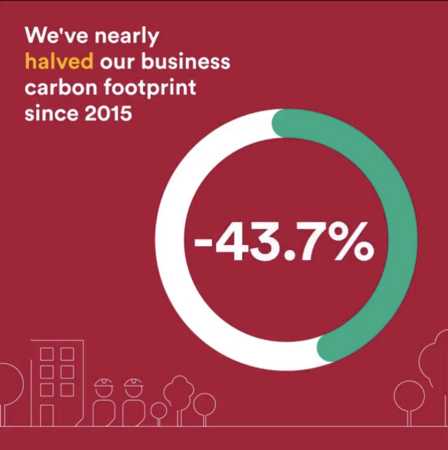
Leading by example.
So many of us are trying to do this both personally and professionally as we collectively strive for net zero.
At Northern Powergrid we’re the cornerstone of the low carbon transition for the communities we serve in the North East, Yorkshire and northern Lincolnshire. We know that the electricity network we manage both powers people’s daily lives today and will enable the connection of, and switch to, more low carbon technologies at an accelerated rate in the years to come.
But our thinking on net zero needs to be much broader than network management.
As an anchor organisation we employ some 2,700 colleagues at our locally based offices and depots, and a similar number of contractors. We also spend approximately £1 million a day in our community and supply chains managing, maintaining and investing in our network. It is therefore vital that we put our internal operations under the microscope and show local leadership about our own business’ carbon footprint.
We’ve already made a good start with this. Each time we compile a business plan for the new regulatory period (the current one is called RIIO ED1 – 2015-23) we set targets, of which our own carbon footprint is one. We’re making excellent progress and have nearly halved our business carbon footprint since 2015.
The roll-out of innovative technology has helped achieve these outcomes; for example, we now use thermal imaging cameras to proactively detect SF₆ leakage from our switchgear and target it for repair. SF₆ is a gas widely used as an insulator in the energy industry. It helps to keep equipment small, reliable and relatively maintenance free, but it is also a powerful greenhouse gas. Controlling SF₆ leaks is one of our biggest challenges.
In 2019 we reduced our business mileage by around 2 million miles. We've also commenced the transition of our largely diesel-powered fleet to electric vehicles. With over 800 vehicles in our fleet, this will be a process that will continue into our next regulatory period. And like many businesses, we’ve bought in more plant-based food at events to normalise lower carbon food choices as we know this is an area where the small things add up.
Although we’re pleased with these improvements, we know that the appetite for decarbonisation has increased since 2015 and our ambition has grown with it: this has led us to set more aspiring commitments in these areas for the next business plan (for the five-year ED2 period starting in 2023).
To achieve net zero operations, we must look to remove or significantly reduce the greenhouse gas emissions that are a product of us running our business. To do this we must start our planning and investment now and ensure that we are continually seeking to minimise the production of carbon during the transition.
We have a long way to go on this journey, but we’re eager to share ideas along the way with peers in other large critical infrastructure companies, interested parties in smaller firms and our customers. We’re pushing ahead with our plans for reducing our business carbon footprint by working alongside regional stakeholders to lead by example and seeking to make real changes inside our business such as:
- adding renewable generation to our main sites.
- replacing vehicles with Ultra Low Emission Vehicles (ULEVs),
- installing renewable generation at new substations and retrofitting it at existing substations,
- improving energy management at our offices to internationally certified standards,
- installing solar panels and bicycle parks at our offices and improving waste management across our sites, and
- empowering and supporting contractors in our supply chain to reduce their emissions.
Ultimately, as a regulated business serving the community, we must always take our cue from our customers and stakeholders.
We’re continuing to engage with customers this year on how we operate as a business and in our region, we’re always seeking to engage and collaborate with stakeholders as we look to making our region a national focal point for the transition to net zero.
Stay up to date with all our upcoming engagement events
By Gordon Walker, Environmental Manager



